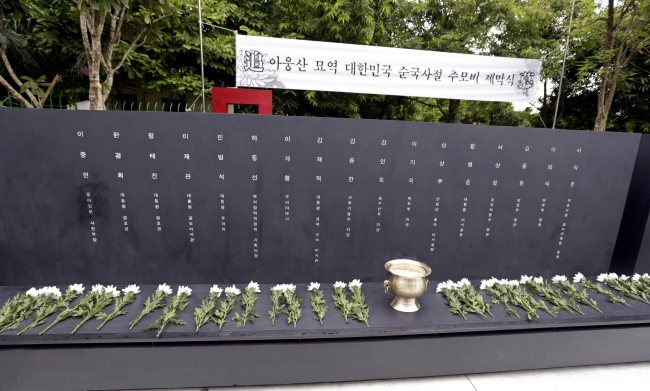YANGON, Myanmar ― Solemnity, sobs and scents of incense filled the air as some 90 South Koreans gathered here on Friday to mark the establishment of a memorial for the victims of North Korea’s deadly bombing in 1983.
The 1.5-meter-high, 9-meter-wide stone monument was unveiled on a 258-square-meter site at the entrance of the Martyrs’ Mausoleum in the former Myanmar capital, engraved with the names of the 17 officials who died during the attack.
The assassination attempt apparently targeted then-President Chun Doo-hwan who was scheduled to pay tribute to Myanmar’s independence hero Aung San at the national cemetery. He survived thanks to traffic congestion that delayed his arrival.
“The bombing terror by North Korean agents was an act of brutality that laid bare the country’s belligerence and ruthlessness to the whole world,” Foreign Minister Yun Byung-se said in an address at the launch ceremony. “It was also an incident that awakened once again the tragic reality of a divided Korean Peninsula.”
Yun also urged Pyongyang to abandon nuclear weapons and follow Myanmar’s path to reform and change, calling it the “only way to repent for its anti-human crime and honor the noble deaths.”
The 1.5-meter-high, 9-meter-wide stone monument was unveiled on a 258-square-meter site at the entrance of the Martyrs’ Mausoleum in the former Myanmar capital, engraved with the names of the 17 officials who died during the attack.
The assassination attempt apparently targeted then-President Chun Doo-hwan who was scheduled to pay tribute to Myanmar’s independence hero Aung San at the national cemetery. He survived thanks to traffic congestion that delayed his arrival.
“The bombing terror by North Korean agents was an act of brutality that laid bare the country’s belligerence and ruthlessness to the whole world,” Foreign Minister Yun Byung-se said in an address at the launch ceremony. “It was also an incident that awakened once again the tragic reality of a divided Korean Peninsula.”
Yun also urged Pyongyang to abandon nuclear weapons and follow Myanmar’s path to reform and change, calling it the “only way to repent for its anti-human crime and honor the noble deaths.”

The ceremony coincided with South Korea’s Memorial Day honoring those who lost their lives in the 1950-53 Korean War. Among the attendees were 23 family members of the victims, a protocol director at Myanmar’s Foreign Ministry and two former ambassadors to Seoul.
As the visitors laid white mums at the statue in turn, some members of the bereaved families began to weep. Kwon Chul-hyun, former ambassador to Japan who heads the steering committee for the project, called the names of the deceased during his mournful speech.
“A thousand emotions crossed my mind,” said Kim Tae-gyun, the son of Kim Yong-han, the late science and technology minister.
“I am proud of (the fallen) even though we had hard times as part of their families. I hope this event will conclude personal and national sufferings and we will all live in freedom from now on.”
Lee Ki-baek, then chairman of the Joint Chiefs of Staff and one of the two sole survivors of the attack, said he had been “feeling guilty” for the past three decades.
“The day remains still vivid in my memory. … I am fortunate enough to take part in today’s ceremony and to have a chance to venerate the souls of the fallen.”
The 730 million won ($714,000) work was incepted following thenPresident Lee Myung-bak’s landmark trip to Naypyidaw in May 2012.
The two countries have been stepping up their partnership since Myanmar’s quasi-civilian government embarked on sweeping democratic and economic reforms in 2011, heralding an end to decades-long military rule. They forged diplomatic relations in 1975.
The Southeast Asian country, also known as Burma, “derecognized” North Korea and severed diplomatic ties in the aftermath of the bombing. The relationship was restored in 2007.
During his three-day visit, Yun clinched an investment promotion and protection treaty and held talks with his counterpart Wunna Maung Lwin, during which he expressed gratitude for Myanmar’s assistance with the memorial and pledged support for its ongoing reform. Yun also met separately with President Thein Sein and Shwe Mann, speaker of the Lower House of Parliament.
“(The monument) represents the close, ever-growing friendship between the two countries. This is a very important, historic event and a landmark in our relationship,” Yun told reporters after the event.
“The ceremony was made possible by the changes that Myanmar has made. North Korea, too, must not disobey this irreversible stream of history, accept our confidence-building proposals and come forward for dialogue and reconciliation.”
By Shin Hyon-hee, Joint Press Corps
(heeshin@heraldcorp.com)









![[Hello India] Hyundai Motor vows to boost 'clean mobility' in India](http://res.heraldm.com/phpwas/restmb_idxmake.php?idx=644&simg=/content/image/2024/04/25/20240425050672_0.jpg&u=)








